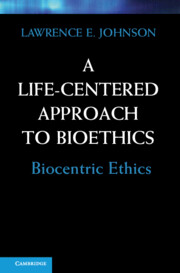Book contents
- Frontmatter
- Contents
- 1 Introduction
- Part I Backgrounds
- Part II Life, Death, and Bioethics
- 6 Being Alive
- 7 Being Healthy
- 8 Health and Virtue
- 9 Death and Life
- 10 Drawing Lines with Death
- 11 Double Effect
- 12 Concerning Abortion
- 13 The Gene, Part I
- 14 The Gene, Part II
- 15 Ethics and Biomedical Research
- 16 Bioethics Seen in an Eastern Light
- 17 Toward a Wider View
- Bibliography
- Index
6 - Being Alive
Published online by Cambridge University Press: 05 June 2012
- Frontmatter
- Contents
- 1 Introduction
- Part I Backgrounds
- Part II Life, Death, and Bioethics
- 6 Being Alive
- 7 Being Healthy
- 8 Health and Virtue
- 9 Death and Life
- 10 Drawing Lines with Death
- 11 Double Effect
- 12 Concerning Abortion
- 13 The Gene, Part I
- 14 The Gene, Part II
- 15 Ethics and Biomedical Research
- 16 Bioethics Seen in an Eastern Light
- 17 Toward a Wider View
- Bibliography
- Index
Summary
Life, and what is involved in living, has a great deal to do with ethics, even when we are not faced with matters of life and death. As I am proposing a biocentric approach to bioethics, it is all the more important that I explicate as clearly as possible what I take life to be. I prefer to ask it this way: What is it to be alive? Thus far I have largely postponed discussion of such topics. There is a point of view that holds that avoiding such discussion is wise, inasmuch as it is far easier and less problematic to recognize what is or is not alive than it is to explicate what life is. According to this line of thought, it is unlikely that much of importance should spring from resolving a conceptual issue that is usually so very easy to determine in practice. Distinguishing the living from the nonliving is something we can readily do in most circumstances. Life forms with which we are quite unfamiliar can usually be determined to be life forms by a nudge, a microscope, or a casual glance. Even a being as generally untalented as a maggot can quite reliably distinguish dead from living flesh. If we ever find extraterrestrial life, it will most probably be far easier to determine that it is alive than to explain in detail why.
Obviously there are tough cases and there are borderline cases. However, I do not approach the subject of what it is to be alive by concentrating on questions of where to draw the line. To be sure, such questions have their place, and they can be of critical importance in biomedical applications. It can sometimes be quite difficult, yet extremely important, to determine whether life is present. (If brain death occurs but heartbeat and respiration continue, artificially supported, is the person still alive? Is the person dead while the human body lives on? What about anencephalic neonates? There are other such questions that may be asked, and means and criteria must be devised when one is dealing with them.) Our inquiries about life will have some important implications in that regard. Just what, however, are we trying to capture with our criteria for determining when life is present or where lines are to be drawn? My concern is not with drawing lines but with developing an adequate and useful account of what being alive is – of what our lines well or poorly demarcate.
- Type
- Chapter
- Information
- A Life-Centered Approach to BioethicsBiocentric Ethics, pp. 121 - 138Publisher: Cambridge University PressPrint publication year: 2010



